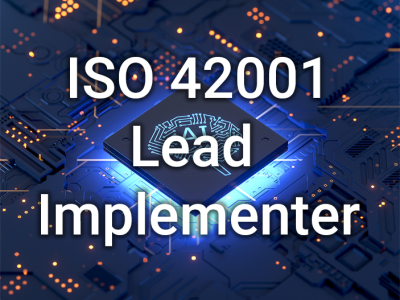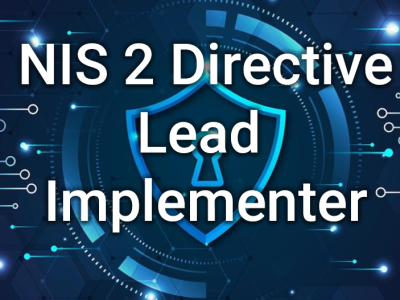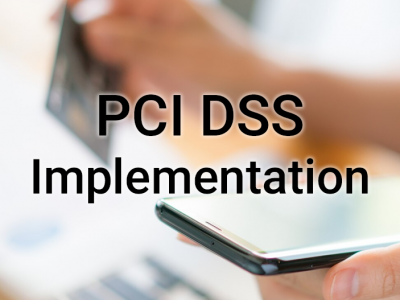ISO/IEC 42001 Lead Auditor
ISO/IEC 42001 Lead Auditor training course enables you to gain the necessary expertise to audit artificial intelligence management systems (AIMS) by applying widely recognized audit principles, procedures, and techniques.
Overview
COURSE DESCRIPTION
Artificial intelligence (AI) has become integral to the success of many organizations by enhancing efficiency through automation and improving decision-making by utilizing advanced data analytics. However, organizations should ensure the appropriate and ethical use of AI. ISO/IEC 42001 enables organizations to implement appropriate processes and controls to ensure the responsible use and management of AI system.
As the number of organizations seeking ISO/IEC 42001 compliance increases, there is a simultaneous surge in demand for skilled auditors possessing the necessary knowledge to assess and verify compliance. Therefore, PECB has developed the ISO/IEC 42001 Lead Auditor training course to empower participants with the knowledge and skills essential for planning and conducting ISO/IEC 42001 audits based on best audit practices.
The ISO/IEC 42001 Lead Auditor training course is beneficial for professionals seeking to stay ahead of the competition. This training course equips you with the expertise needed to navigate the intricate realm of AI-influenced organizational frameworks, ensuring you are well-prepared to contribute to the success of organizations in this transformative era.
After finishing the training course, you will be eligible to take the exam. After passing the exam, you will be able to apply for the “PECB Certified ISO/IEC 42001 Lead Auditor” credential. This certification proves your professional expertise in auditing organizations against ISO/IEC 42001 based on best auditing practices.
CERTIFICATION
Upon completion of the course, should you pass the exam successfully, you will receive an internationally recognized certificate.
LEARNING OBJECTIVES
After completing this training course, you will be able to:
- Explain the fundamental concepts and principles of an AI management system based on ISO/IEC 42001
- Interpret the ISO/IEC 42001 requirements for an AI management system from the perspective of an auditor
- Evaluate the AI management system conformity to ISO/IEC 42001 requirements in accordance with the fundamental audit concepts and principles
- Plan, conduct, and close an ISO/IEC 42001 compliance audit, in accordance with ISO/IEC 17021-1 requirements, ISO 19011 guidelines, and other best practices of auditing
- Manage an ISO/IEC 42001 audit program
PREREQUISITES
The main requirement for participating in this training course is having a fundamental understanding of ISO/IEC 42001 and AI principles and concepts.
EDUCATION APPROACH
- This training is based on both theory and practice.
- Sessions of lectures illustrated with examples based on real cases.
- Practical exercises based on a full case study including role playings and oral presentations.
- Review exercises to assist the exam preparation.
- Practice test similar to the certification exam.
GENERAL INFORMATION
- The certification fee is included in the cost of the exam.
- Participants will be issued with a CPD (Continuing Professional Development) certificate.
- In case of failure to pass the exam, participants are allowed to take the exam free of charge under certain conditions.
COURSE AGENDA
•Section 1: Training course objectives and structure
•Section 2: Introduction to ISO/IEC 42001 and management systems
•Section 3: Certification process
•Section 4: Fundamental concepts and principles of artificial intelligence
•Section 5: Overview of ISO/IEC 42001 requirements
•Section 6: Fundamental audit concepts and principles
•Section 7: The impact of other technologiesin auditing
•Section 8: Evidence-based auditing
•Section 9: Risk-based auditing
•Section 10: Initiation of the audit process
•Section 11: Stage 1 audit
•Section 12: Preparing for stage 2 audit
•Section 13: Stage 2 audit
•Section 14: Communication during the audit
•Section 15: Audit procedures
•Section 16: Creating audit test plans
•Section 17: Auditing the requirements of ISO/IEC 42001
•Section18: Drafting audit findings and nonconformity reports
•Section19: Audit documentation and quality review
•Section20: Closing of the audit
•Section21: Evaluation of action plans by the auditor
•Section22: Beyond the initial audit
•Section23: Managing an internal audit program
•Section24: Closing of the training course
- The examination is conducted online, and you may select a day and time that is convenient for you.
COURSE DATES AVAILABLE FOR REGISTRATION
ASK OR REGISTER
Do you have questions about the course? — Please fill in your details and we will contact you.
Frequently Asked Questions
PECB credentials are internationally recognized and endorsed by many accreditation bodies, so professionals who pursue them will benefit from our recognition in domestic and international markets.
The value of PECB certifications is validated by the accreditation from the International Accreditation Service (IAS-PCB-111), the United Kingdom Accreditation Service (UKAS-No. 21923) and the Korean Accreditation Board (KAB-PC-08) under ISO/IEC 17024 – General requirements for bodies operating certification of persons. The value of PECB certificate programs is validated by the accreditation from the ANSI National Accreditation Board (ANAB-Accreditation ID 1003) under ANSI/ASTM E2659-18, Standard Practice for Certificate Programs.
PECB is an associate member of The Independent Association of Accredited Registrars (IAAR), a full member of the International Personnel Certification Association (IPC), a signatory member of IPC MLA, and a member of Club EBIOS, CPD Certification Service, CLUSIF, Credential Engine, and ITCC. In addition, PECB is an approved Licensed Partner Publisher (LPP) from the Cybersecurity Maturity Model Certification Accreditation Body (CMMC-AB) for the Cybersecurity Maturity Model Certification standard (CMMC), is approved by Club EBIOS to offer the EBIOS Risk Manager Skills certification, and is approved by CNIL (Commission Nationale de l’Informatique et des Libertés) to offer DPO certification.
All certification candidates are responsible for their own study and preparation for the examination. No specific set of courses or curriculum of study is required as part of the certification process. Likewise, the completion of a course or program of study will significantly enhance your chance of passing a PECB certification examination. To learn more about exams, competency domains and knowledge statements please go to: PECB Exam Preparation Guides.
The exam is conducted online using the PECB Exams app
You will have the opportunity to choose a convenient date and time from the list of proposed slots.
Candidates will be required to arrive at least 30 minutes before the start of the certification exam. Candidates arriving late will not be given compensatory time for the late arrival and may be denied to enter the exam. All candidates are required to present a valid identity card such as a national ID card, driver’s license, or passport to the invigilator. The duration of the exam varies according to the type of examination taken (see description of the different exams for more details). Additional time can be provided to candidates taking the exam in a language different than their mother tongue (when requested by the candidates, on the exam day).
For more information about exam details, please visit Examination Rules and Policies
Results will be communicated by email within a period of 6 to 8 weeks from your examination date. The candidate will be provided with only two possible examination results: pass or fail, rather than an exact grade.
In case of a failure, the results will be accompanied with the list of domains where the candidate failed to fully answer the question. This can help the candidate better prepare for a retake the exam.
To qualify for PECB credentials, candidates must not only pass the exam but also meet certain educational and professional prerequisites. Each PECB certification has specific education and a set of experience requirements.
Candidates are required to fill out the online Certification Application Form, and fill out all other online forms (that can be accessed via their PECB online profile), including contact details of references who will be contacted to validate the candidates’ professional experience. Lastly, before the submitting the application, a candidate can choose to pay online or be billed. In case the candidate needs additional information, he/she should contact accounting@pecb.com and/or certification@pecb.com.
The approval of the application occurs as soon as the Certification Department validates that you fulfil all the certification requirements regarding the credential you have applied for. An email will be sent to the email address you provided during your application process to communicate you application status. If approved, you will then be able to download your certificate from your member account.
PECB certifications are valid for three years. To maintain the certification, the applicant shall demonstrate every year that he/she is still performing tasks that are related to the certification. PECB Certified professionals shall annually provide PECB with the number of hours of auditing and/or implementation related tasks they have performed, along with the contact details of individuals who can validate such tasks. Additionally, certified professionals should regularly pay the annual PECB certification maintenance fees.
A notification email is sent to our certified members, who are required to submit their Continuing Professional Development (CPD) along with the Annual Maintenance Fee (AMF) three months before the annual date of their certification. The PECB certified members will then be able to submit their CPDs by visiting their account and providing the required information for the respective certification.
You May Like
ISO/IEC 42001 Lead Implementer
The ISO/IEC 42001 Lead Implementer training course provides the participants with the essential competencies needed to effectively plan, implement, manage, monitor, maintain, and continually...
NIS 2 Directive Lead Implementer
The Certified NIS 2 Directive Lead Implementer training course enables participants to gain the necessary competencies to support organizations in effectively planning, implementing, managing,...
DORA Lead Manager
The PECB Certified DORA Lead Manager training course equips you with the necessary skills to lead and oversee the implementation of digital operational resilience...
ISO 9001 Lead Auditor
ISO 9001 Lead Auditor training enables you to develop the necessary expertise to perform a Quality Management System (QMS) audit by applying widely recognized...
PCI DSS Implementation
This two-day course equips participants with theoretical knowledge and practical skills to implement processes following PCI DSS requirements






